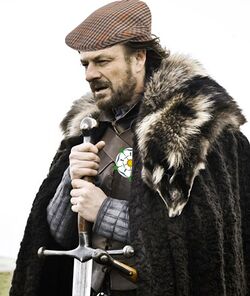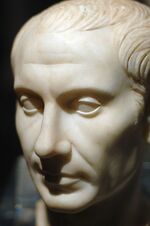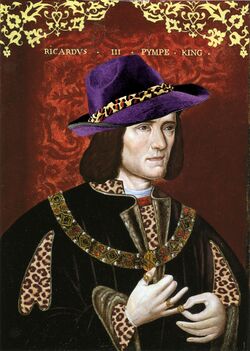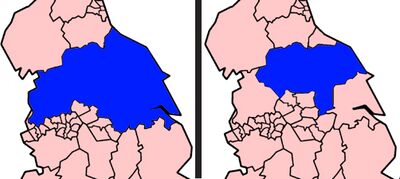Yorkshire
“Lanky bastards.”
“Yorkie bastards.”
Yorkshire [say "Yourck-sher"] is a northern district of England; or, alternatively, a southern district of Scotland. It is most famous for its annoying little dogs and vaguely sexist chocolate. Sadly, this once great county has been plagued with poverty since its resident nobility moved south after a truce with the Lancasters (known in Yorkshire as the "Lankies") and spent all their profits from the War of the Roses on a fancy new palace. This left Yorkshire with nothing but peat. In recent times, though, tourism has helped Yorkshire greatly on its epic journey to economic stability; tourists flock to see stones, water and Yorkshire's famous turf, the best in the world according to connoisseurs. They also come to find out more about Yorkshire's rich heritage, notable for wars with the Scots, the Lancasters and anyone else who wants a go.
History[edit]
Early History[edit]
Yorkshire was founded in the early first century AD by The Up North Crew, a notorious Celtic gang, then led by York "Mofo" Minster. A schism soon occurred, however, when his brother Lank "Amazeballs" Minster attempted to seize control. The gang split into two factions, the Yorks and the Lanks, beginning a rivalry that would last for centuries. The Yorks seized a sizeable chunk of Northern England for themselves; however, in the years that followed, the Lanks, Scots and Hull City A.F.C. all encroached upon this territory.
The Romans stepped in, however, and threw all of them out, Yorks included. The Yorks were happy enough, one of them noting that "at least it was fair". When the Lanks got some of their land back, however, this gang member was scalped.
Eventually, the Romans bored of Britain, with its tea, its dry wit, and overuse of the letter U. The camel's back finally broke when Julius Caesar decided he disapproved of Monty Python (specifically their jokes about his friend Biggus Dickus). The armies retreated back to their homeland of Italy, welcoming its organised crime, pizza, and motor scooters. Remnants of Roman buildings can still be seen today, notable for their nude statues, the crowds of giggling children gathered around them, and the graffiti those children leave behind.

Rise of the House of York[edit]
In the eighth and ninth centuries, the Yorks came to be known as the Mighty House of York, having gained a sizeable amount of money and land from other neighbouring tribes and from Romans who'd been left behind by the others because they slept in late. Under Lord Eddard "Ned" York, the first great "Lord of the North", they became renowned for their military power. In the 11th century they forcibly took control of England after the mess that was the Crusades. The first Yorkie king was Henry Plantagenet, who initiated the War of the Roses against the Lankies; the lineage ended with the war when the last Yorkie king, Richard III, was killed by Henry Tudor, a Lankie, at the Battle of Bosworth Field.
The Wars of the Roses[edit]
Richard III was known as the "Pympe King" because of his numerous ventures into organised crime. His ring hand was feared throughout Britain. When he was challenged by Henry Tudor, a half-Welsh milk salesman who had once failed to kill a man, despite shooting him in the head with a crossbow twice, Richard was unfazed; he wouldn't even have to wear his dreaded rings for this fight. (At the time, Henry's only claim to the throne was that his fourth cousin's friend's brother-in-law had once sat next to a man in his local pub who had seen a royal butler buying milk at Tesco. However, this claim was later amended; it transpired it was Henry's second cousin.)
But Richard was foolish. Henry, knowing that he could not win the fight, wisely sent a Terminator made in his image to lead the charge against the Yorkie hordes. It was initially feared that the Henrynator, being made out of a scarecrow and some leftover armour, plus some pulleys to make its arms flap a bit, was not going to win the fight. However, Richard kept on pimp-slapping the machine, only to find it did not react. Exhausted, he collapsed on the ground; at this point the real Henry jumped out of the bushes and stabbed Richard several times in the cranium. One of his knights then came over and finished the job, as Richard was still alive and kicking. This led to the Yorkie army to stage a strategic withdrawl into the Pennines, from where they are still regrouping to this day, awaiting the time for their final assault upon the Lanks and their false claim to England. If you look carefully you may see the changing of the sniper guard near Saddleworth from where they maintain watch over the Lanks on the M62.
Thus, Henry Tudor was crowned King Henry VII. He married a distant Yorkie cousin of Richard's, creating the Tudor royal family (whose motto was "No Hard Feelings, eh?"). The Tudors moved down south to London and built many different palaces for each family member to live in (they also had five summer homes and a secluded manor house in the country each). Inevitably, this was all taken out of Yorkshire's bank account, causing financial devastation for the next few hundred years.
Factories[edit]
As a solution to this, the great industrialists of the Victorian era built thousands of factories to create jobs. These factories were universally described as "well grim", particularly by those down south in London and Essex. However, they helped in some small ways to recover Yorkshire's financial situation, as well as making every Yorkie city substantially more depressing. This trend for paying workers very little in order to build (more, bigger, but not better) factories that would, in turn, employ more underpaid workers, was christened by Professor G. Upnett-Spinkler, of the renowned Factory Department at Leeds University, as "Factory Fever". This name never caught on with the populace, but it became the official term at the university from the 1890s onwards. Factory Fever itself, however, did catch on, even outside Yorkshire. This essentially began the corporate revolution that led to the creation of Tesco, WalMart, MacDonalds, KFC, the dreaded LIDLS, Starbucks, and Burger King, among other things. Because the industrialists who had sparked the movement kept their own identities hidden, "for the good of the people, honest!", the resulting protesters were unsure who to direct their anger towards. They eventually settled on Professor Upnett-Spinkler, and subsequently beat him to death with his own desk lamp. Shortly afterwards, the police arrived and joined in.
Tourism[edit]
This cycle of corporate expansion, protest and police brutality continued until the late 20th century, when a yuppie and his wife were forced to drive through North Yorkshire and discovered how wonderful it was if you stayed away from the people (which isn't too hard in North Yorkshire). They later bought Yorkshire County Council and began a massive advertising campaign for Yorkshire's beautiful "grass and stuff". This campaign was originally unsuccessful, until an advertising executive decided the grass and stuff needed a catchier name. They renamed it "the Yorkshire Dales" after the executive's famous pet chipmunk, Dale, and the campaign brought popularity, summer homes, and moneys to the Yorkies (though, as per their contract, 98% of the summer homes and all of the moneys went to the yuppies). Yorkshire's economic recovery had begun (though it is still classified a "shitty, shitty place" by the Government of the UK).
Geography[edit]
In the years after the Romans left, Yorkshire was divided into four different counties:
- North Yorkshire, a very large area with not very much in it, distinguished from the other counties for its ridiculous size, derelict mills, and overabundance of peat. It is the only district still officially owned by the Yorkies.
- South Yorkshire, an unassuming little footnote to North Yorkshire. Its only known city is Sheffield, where the UK's supplies of scissors, knives and sheet metal are manufactured and shipped off to other equally depressing districts. South Yorkshire also contains Doncaster, a well-known racecourse (rumours of a nearby town are thought to be an urban legend) and the People's Republic of Rotherham, a satellite state of the former USSR.
- West Yorkshire is, essentially, a slightly bigger, more crowded version of South Yorkshire, and the corrupt British police force's stomping ground. It is notable for looking earth-shatteringly average, except its administrative capital, Leeds, which is just as earth-shattering in terms of forgotten universities, bland shopping centres and violent football fans. It is co-owned by the Romans, who, by now, are too fat to come visit, and the aforementioned
corruptjust, honest, hard-working police force. - The East Riding of Yorkshire is a poorly-named seaside county owned by violent fans from Leeds who have moved to Hull and renamed themselves Hull City A.F.C.. The capital, Hull itself, is a city struggling for help as it sinks into the bay and the dominion of Lord Cthulhu. It is second-only to Middlesbrough in the national competition for the worst place to live (a strangely coveted accolade). Hull City A.F.C. are desperate to do their city proud - please support them in their campaign to make the city worse.
Dialect[edit]
Yorkies speak an unusual dialect, with the interesting feature that most words begin with the letter T. Below are some words you will need to be familiar with when traveling in Yorkshire:
- Table-bodied: People as yet uninjured.
- Tat: Headware.
- Train: Water falling from the sky.
- Trash: An itchy, often red or red-and-white skin condition.
- Towel: A nocturnal bird of prey.
- Toil: Liquid fossil fuels and lubricants derived from them, or synthetic versions of the same.
- Trout: A disorderly retreat of a defeated army.
- Tad: Abbreviation of advertisement.
- Tow: Injury.
- Tin-side: Opposite of tout-side.
- Tap: Computer programme that runs on a mobile device.
- Ten: Female chicken.
- Tact: Part of a play.
- Tram: Male sheep.
- Tart: Classical depiction of female nudes.
- Tire: Anger.
- Troy: A man named Roy.
- Tray: A man named Ray.
- Trick: A man named Rick.
- Trio: Brazilian city famous for its tart.
- Tear: Aural receptacle.
- Trap: Awful sounds listened to by Southerners who visit in their tarted-up motors.
- Tale: Beer.
- Twin: Elizabeth of York marrying Henry Tudor.
- Tape: Scostman.
- Tend: The Act of Union 1707.
- Tell: A length of cloth.
- Took: Noise made by tapes.
- Terror: Richard III.
- Tweed: Principle export of Yorkshire, commonly sold to Southerners on holiday who smoke it, mistaking it for something else.
- Thigh: What Southerners think they'll get from smoking tweed.
- Trail: The great Northern invention.
Sport[edit]
Athletics[edit]
Yorkshire has a long history of sporting successes. In the 2012 nesh southerner games, despite having a population of only 5 million, most of whom are over 65 years of age or are instead small terriers, Yorkshire won more medals than both Lancashire and London, ultimately proving that a diet of pies, bitter and Bovril do indeed make the best athletes.
See also[edit]
| Yorkshire — God's Oan Counteh | ||

|
York | Barnsley | Conisbrough | Doncaster | Halifax | Harrogate | Helmsley | Huddersfield | Hull | Keighley | Leeds | Morley | Northallerton | Rotherham | Scalby | Scarborough | Sheffield | Skipton | Wakefield | Whitby |

|


